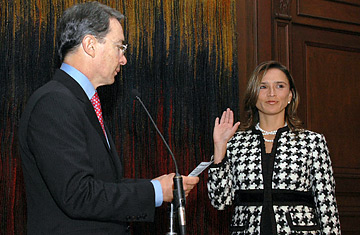
Colombian president Alvaro Uribe (L) swears in the new Colombian Foreign Minister, Maria Consuelo Araujo (R), Aug. 07, 2006 in Bogota. Araujo resigned her position Feb. 19, 2007.
The latter problem seemed to have been slightly defused Monday with the resignation of Foreign Minister Maria Consuelo Araujo. But not before the spectacle of seeing her brother Sen. Alvaro Araujo charged not only with collusion with the para warlord who controlled his home region, but also with participating in the kidnapping of a rival politician. When Sen. Araujo was called in for questioning last fall, local pundits had called for Minister Araujo's resignation. But Uribe said he refused to "sacrifice" his foreign minister because of the possible misdeeds of her brother. Nevertheless, after the senator's arrest on Feb. 15, domestic and international pressure forced Minister Araujo's resignation, to the relief of other cabinet members. "It became evident that the situation was untenable," said Defense Minister Juan Manuel Santos, who had just launched a campaign to drum up international funding of military and social programs for the next six years. "In every meeting [with foreign dignitaries] we had to explain about the foreign minister's situation."
The scandal comes just as Colombia has launched a campaign to drum up some $12 billion of support from the U.S. and Europe to finance a sequel to Plan Colombia, a controversial strategy to fight leftist rebels and drug trafficking. Under the first Plan Colombia, Bogota received more than $4.5 billion in the past six years from the United States in mostly military aid. An additional $1 billion came from donations from European nations which supported social programs and alternative development schemes to wean farmers off growing drug crops like coca. But support for that aid in the Democrat-dominated U.S. Congress is far from a done deal. Several U.S. lawmakers had already expressed reservations about the Bush administration's 2008 budget request for Colombia, which they had hoped would shift its focus to supporting social programs rather than continuing a militaristic approach. Instead, the Bush administration's request is 76% military. With the paramilitary scandal now touching Uribe's cabinet, U.S. lawmakers will be even more wary of digging deep into American pockets.
Congress must also consider whether to ratify a free trade agreement signed between the Bush Administration and the Colombian government last year. Defense Minister Santos recently returned from a trip to Washington, London and Brussels where he presented Plan Colombia II. The the para-politica scandal, as it has come to be known, may still mean it will be a hard sell, said Santos, but the foreign minister's resignation "makes my job a bit easier."
The scandal is considered the most serious to hit drug- and violence-torn Colombia in more than a decade. It has been building for months since the Supreme Court opened investigations into allegations of close-knit relations between politicians and the paramilitary groups that have long controlled different areas of the country through murder and intimidation. So far eight federal lawmakers are behind bars awaiting prosecution. One senator, whose arrest warrant was issued along with Sen. Araujo's, is at large and believed to be in Germany. And even as the foreign minister was announcing her resignation, the Supreme Court, which in Colombia is charged with investigating and prosecuting crimes by sitting lawmakers, was questioning three senators who, along with some 40 other politicians, signed a manifesto describing "a new social pact" between paras and politicians to form a new power, at about the same time the paramilitary groups were declared terrorists by the U.S.
Colombia's paras were originally formed by wealthy cattle ranchers, business owners and drug mafias in the 1980s to fight off extortion and kidnapping by leftist guerrillas. The paramilitaries later turned into powerful armies heavily involved in drug trafficking and extortion themselves, and who used their power to control local politics, including prosecutors' offices and courts. The former chiefs of the militia groups, which demobilized as many as 30,000 troops in the past three years, are currently being prosecuted for their crimes under a controversial law that grants them reduced prison sentences of up to eight years for confessing to crimes. Few of the charges that have been filed against the lawmakers stem from those paramilitary hearings, but analysts expect more politicians to be implicated when the militia leaders begin recounting their crimes. Despite persistent allegations that Uribe himself has ties to paramilitaries, no credible evidence has ever been presented. However, opposition Senator Gustavo Petro has vowed to schedule hearings into the spread of paramilitary power in northern Antioquia province when Uribe was governor there.
